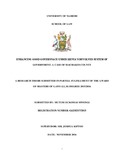| dc.description.abstract | The term ‘good governance’ has become a common vernacular in development and scholarly discourse. Countries are required to employ good governance practices in key decision making and implementation. The United Nations Development Program (UNDP) identifies participation, accountability, transparency, rule of law, equity, consensus oriented, efficiency, effectiveness and responsiveness to the needs of the people as elements of good governance. These elements have become universally accepted. In order to enhance governance, countries are adopting various mechanisms. One of the mechanisms is through decentralization of power. It is argued that decentralization of power provides an environment in which good governance thrives by fostering local participation, accountability, transparency, efficiency and responsiveness to the needs of the people. This study also proceeds from the understanding that the “goodness” of good governance is in promotion of common good in the way public goods for example development programs and public appointments as well as government services are provided to citizens of a country.
In 2010, Kenyan changed its governance system to a devolved system of governance. This was informed by the inadequacies of the centralized system which was characterized by challenges including bureaucratic inefficiencies, lack of accountability and transparency, marginalization, unequal distribution of national resources, lack of public participation, patronage, rent seeking, ethnicity amongst others.
Good governance and its principles are recognized under Article 10 of the Constitutional of Kenya 2010 (CoK) as part of the national values and principles of Kenya’s governance. The objectives, principles and functions of devolution are tailored towards achievement of good
xiv
governance. The legal framework such as the County Government Act, Public Finance Management Act, Leadership and Integrity Act and the Public Officers Ethics Act all aim at fostering good governance. The legal framework establishes an elaborate institutional framework such as county decentralized units in addition to the County Assembly to offer oversight over the County Executive and County treasuries. In 2013, the devolved government was established and one of its mandates was to foster good governance for development. However, since its inception devolution has faced a myriad of challenges threatening good governance such as corruption, misuse of public resources, political patronage, and impunity amongst others. The need to inquire into the structures County Governments have put in place to enhance good governance and development is inevitable. This study uses Machakos County as a case study to determine what institutional and legal framework are in place to ensure good governance, identifies the challenges facing the achievement of good governance at the counties and recommends the way forward in resolving these challenges. | en_US |



